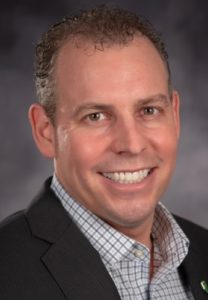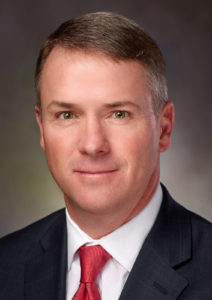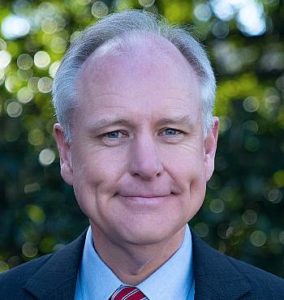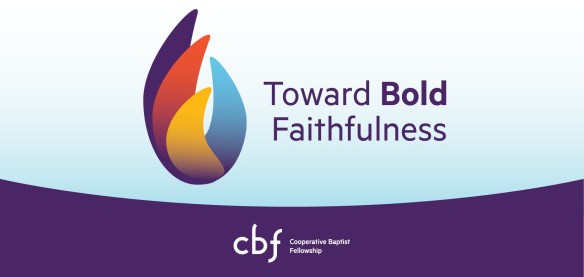The Cooperative Baptist Fellowship’s Governing Board adopted a 2021 budget that calls for a 10% reduction in expenditures, which will primarily be achieved by staff adjustments.
Meeting in executive session by Zoom conference Oct. 1, the 16-member board adopted a 2021 budget with a revenue projection of $14.68 million, down from $16 million. That includes an overall revenue reduction of $1.6 million but a $2.1 million reduction from current unrestricted spending. The board had been authorized in 2019 to drawn down reserves to balance the 2020 budget.

Jason Callahan
A high-level report on the budget was presented to the Governing Board in open session the next day, Oct. 2, by Jason Callahan, a layman from Memphis who chairs the Finance Committee. He and Paul Baxley, CBF executive coordinator, said the full budget would be released by mid-October after Baxley has time to speak with all CBF staff personally about the changes.
“It grieves me that there is not a way forward for us that involves all of them,” Baxley told board members. “For that reason, I asked the Governing Board to give me the space to talk with each person before the budget is released. Some will learn their work is continuing, perhaps in expanded ways. Some will learn that their service with CBF has ended.”
Additional financial details were not released in the open session.
“We made a commitment that we will have an incredibly transparent process on budget,” Callahan said. “And we plan to do that. We still have some details to work out. There are conversations to be had, and then we will publish the budget in its entirety in mid-October. … It is still our intention to be 100% transparent.”
In addition to the overall revenue reduction, the 2021 budget includes “reallocations” to align spending with the priorities of the Toward Bold Faithfulness strategic planning objectives, he added.
Moderator’s response
Citing gratitude for Baxley’s leadership, CBF Moderator Carol McEntyre said after the meeting: “We have listened deeply to the Fellowship and have sought the leading of the Holy Spirit regarding priorities for the future. These actions have allowed us to come to the budgeting process with a clarity about our future priorities, which has been essential at a time when we need to balance our budget and create a more sustainable path forward.

Carol McEntyre
“We recognize that a more sustainable path will require personnel changes, which is painful to consider because the Fellowship is a beloved community, where we care deeply about one another,” said McEntyre, pastor of First Baptist Church in Columbia, Mo. “The difficult work of the Governing Board these last few days has been to acknowledge the grief and loss brought about by these necessary personnel changes while looking to the hope for our future reflected in the Toward Bold Faithfulness process.”
McEntyre co-chaired the project’s Discovery Team and now serves on the Collaborative Response Team. “We ask you all to be in prayer with us for this process and for those personnel affected by these upcoming changes,” she said.
Newly defined objectives
Discussion of Toward Bold Faithfulness occupied the majority of time within the two-hour meeting Oct. 2. Baxley and Kyle Reese of Jacksonville, Fla., co-chair the Collaborative Response Team that has been processing data from an expansive survey of clergy, laity and mission partners.

Kyle Reese
Despite the appearance of scarcity in proposing a budget reduction, Reese urged the board to see abundance in God’s provision for a way forward.
“We went at this with a belief in God’s abundance. Sometimes it’s harder to find than others, but it is there. We will find enough to do the will and way of God.”
In highlighting the findings and recommendations of Toward Bold Faithfulness, Baxley said five things must be true:
- A continued and growing focus on the health and vitality of congregations.
- A clear and compelling sense of identity.
- Expanded commitments to partnerships.
- Explicit commitment to diversity and inclusion.
- Strategic alignment between CBF global and state and regional organizations.
“Healthy and vital congregations are uniquely suited to be the front line of addressing those needs in communities,” Baxley said. “In helping congregations address their own urgent needs, we help position our congregations to be agents of healing and reconciliation in their communities.”
This will create stronger and closer relationships between congregations and CBF field personnel around the world, he added. And it will require stronger collaboration between CBF’s state and regional organizations, autonomous bodies that relate to CBF global in different ways.
Baxley said the survey work revealed common needs in congregations across the nation that could be best addressed by a coordinated approach between CBF global and the state and regional organizations.

Paul Baxley
That will have additional financial implications, Baxley said. As part of the research in Toward Bold Faithfulness, data was collected from CBF global and all state and regional organizations for a 12-month period ending April 30, 2020. “Everybody turned in data from the same period of time,” he explained.
During that year, nearly $22 million was contributed to support the combined operations of CBF-related work, Baxley said, meaning several million dollars regularly flow through the state and regional organizations that never directly touch CBF global.
This is, in part, a result of “multiple funding arrangements” that exist between CBF global and the state and regional organizations, he explained. “Over time they have negotiated different kinds of funding arrangements.”
How that challenge will be addressed was not stated explicitly to the Governing Board, but the need for closer alignment between CBF global and state and regional organizations was a recurring theme of the report.
Autonomous relationships — not just with state and regional organizations but also with various partner ministries — has been baked into CBF’s structure from the beginning, Reese noted. “Partnership has been key to CBF from the beginning. We didn’t want to own anything.”
Another goal of implementing Toward Bold Faithfulness is to address diversity and inclusion, Baxley and Reese explained.
“There is both a sincere and unmistakable desire in our fellowship for more diversity but also a realization that we have many miles to travel before that desire will be fully realized.”
“There is both a sincere and unmistakable desire in our fellowship for more diversity but also a realization that we have many miles to travel before that desire will be fully realized,” Baxley said.
“We were challenged to be explicit about the biblical and theological foundations for this commitment to greater diversity and inclusion,” he added. “Not because this is culturally sensitive in this moment but because this is inspired by the person and work of Jesus Christ. … If we are really to be an instrument of Jesus’ mission in this world today, relationships with an increasingly diverse community are essential both for our witness in the world and for our growth.”
Such a witness “necessarily includes the elevation of Black and brown voices,” he added. “We have to continue to increase diversity in staff and volunteer positions all across our fellowship. If we are not embodying, we cannot invite.”
Among other implications of Toward Bold Faithfulness, Baxley and Reese said, must be “amplification of global missions” and networking among congregations that not only are recipients of resources but sometimes the creator of resources. Rather than being a direct provider of services to congregations, CBF should find its place as a “convener” of conversations that strengthen congregational life and missions, they said.
Budget preparation timing
One of the unexpected opportunities created by the lack of travel during the current pandemic has been a necessary delay in crafting a 2021 budget, both Baxley and Callahan said. Normally, the next year’s budget is presented at the General Assembly in June, six months before it takes effect.
“This is a pivotal, transitional moment for our fellowship,” Baxley said, adding that the new budget “will put the fellowship in an affordable, sustainable position from which we can grow.”
“This is the first time we’ve presented a balanced budget that’s realistic.”
Callahan noted he has served on the Finance Committee for a number of years and “this is the first time we’ve presented a balanced budget that’s realistic.” That was possible, he said, because “we’re working with a full deck of cards.”
“We typically present a budget during General Assembly, so back up three months to develop the budget. We only have four to five months of actual data to work off of to forecast the next fiscal year’s budget — to forecast something that’s going to happen seven to 14 months later.”
This year, “we were able to use 11 months of actual data, which was critical for us to develop a realistic budget that is truly sustainable.”
Other items reported to board
In the executive coordinator’s report, Baxley announced that after a national search for an associate coordinator for operations, an internal candidate has been named to the role. Becky Hall came to work for CBF in 1993 and most recently has served as global missions finance and administration manager.
“She brings a rare level of trust and respect across our staff, from our field personnel, from our partners,” he reported. “Words of recommendation for her came from all sectors of our fellowship.”
Baxley also announced that CBF is the recipient of a $1 million grant from the Lilly Endowment that will be used to “create new strategies to strengthen congregations.” These funds will be expended over more than one year and will show up as increased restricted spending, not budget expenditures, he explained.
In closing, he addressed the racial justice issues that have brought America to a boiling point over the summer.
“Racial injustice is a chronic pandemic that is an affront to God,” he declared. “If that pandemic is to be ended, there are words we each must speak, there are times we each must listen, … and there’s learning we all have to do.”
In times like these, “I have been inspired by the persevering faithfulness of Black and brown cooperative Baptists who have taken the risk of hanging with a predominantly white community like this.”
“Diversity work is sometimes called making space at the table. I think our work is going to be to set a whole new table.”
Moving forward will require patience, he added. “The way to our future requires all of us and not just some of us. … Diversity work is sometimes called making space at the table. I think our work is going to be to set a whole new table.”
That will require “a spirit of openness rather than a spirit of fear,” Baxley said. “The dominant response to difficulty is fear. The initial response to diversity of experience or position or theology is fearful retreat. Then it usually grows into demonization.”
However, “the first work of the risen Jesus after Easter Sunday was to open the minds of his disciples. He opened their eyes so they could recognize him. Easter morning begins with opening something that was closed. If we are going to be open to the future we are being called toward, we’re going to have to adopt a posture of openness.”
Related articles:
CBF Governing Board will consider significant budget changes this week

